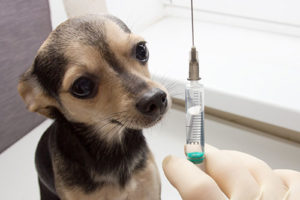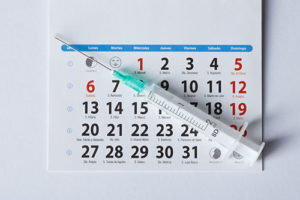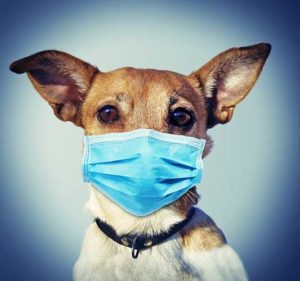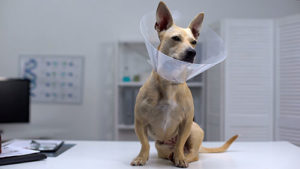 Did you know scientists first developed the animal vaccine way back in 1879? Back then, an epidemic would wipe out hordes of animals, leaving the farmers ruined financially. While you cannot ensure your puppy’s health, you can start with the vaccine. Vaccines help protect your new puppy from a host of life-threatening fatal illnesses. Some are mandatory, and the others are primarily dependent on the location and the lifestyle of the puppy. According to American Animal Hospital Association, puppies should be vaccinated starting from 6-8 weeks of age. Our article brings to you everything you need to know about the vaccination process, the shots your puppy needs, its vaccination schedule, and much more.
Did you know scientists first developed the animal vaccine way back in 1879? Back then, an epidemic would wipe out hordes of animals, leaving the farmers ruined financially. While you cannot ensure your puppy’s health, you can start with the vaccine. Vaccines help protect your new puppy from a host of life-threatening fatal illnesses. Some are mandatory, and the others are primarily dependent on the location and the lifestyle of the puppy. According to American Animal Hospital Association, puppies should be vaccinated starting from 6-8 weeks of age. Our article brings to you everything you need to know about the vaccination process, the shots your puppy needs, its vaccination schedule, and much more.
What Shots Do Puppies Need?
Vaccines protect your puppy against potentially dangerous or even deadly viruses. Below are the potential vaccines that your veterinarian may suggest for your puppy. You must know the essential vaccines and the optional ones.
A highly contagious virus that affects the central nervous system causing vomiting, loss of appetite, weight loss, fever, and severe bloody diarrhea leading to death in 48-72 hours; There is no cure, and unvaccinated puppies, four months and younger, are highly susceptible.
Rabies
A virus transmitted through the bite of rabid animals; affects the central nervous system causing excessive drooling, anxiety, headache, hallucinations, paralysis, fear of water, and eventually death. Check with your vet for rabies vaccination laws since it is mandatory in most states.
Bordetella Bronchiseptica
A highly infectious bacteria that is the primary cause of kennel cough. It is characterized by severe coughing, vomiting, whooping, and in rare cases, seizures leading to death. While it is not mandatory, most dog daycare centers or puppy boarding services require the vaccine.
Kennel Cough
Caused by the inflammation of the upper airways due to virus(parainfluenza) or bacteria(Bordetella). Though mild, it causes respiratory distress due to a harsh dry cough. It spreads quickly, primarily when kept together.
Canine Distemper
A contagious virus that affects the respiratory and GI tract, nervous system, etc., causing discharges from eyes and nose, coughing, vomiting, fever, diarrhea, twitching, seizures, and paralysis. There is no cure, and it can be fatal in severe cases.
Canine Hepatitis
A highly contagious viral infection that affects the liver, kidneys, spleen, lungs, and eyes; Symptoms include fever, nasal congestion, vomiting, stomach enlargement, jaundice, etc. There is no cure, and severe forms can kill. This has no connection to the human form of the virus.
Canine Parainfluenza
A highly contagious respiratory virus that causes kennel cough in puppies;
Canine Coronavirus
Affects the GI system and causes respiratory infections, vomiting, loss of appetite, and diarrhea;
Leptospirosis
A zoonotic disease caused by bacteria; Symptoms include vomiting, abdominal pain, diarrhea, jaundice, loss of appetite, muscle pain, stiffness, weakness, lethargy, infertility, kidney failure, liver failure, etc.
Lyme Disease
Transmitted via ticks, the symptoms include swelling of lymph nodes, fever, and loss of appetite. If left untreated, it can affect its heart, kidney, lungs, and joints.
Essential Puppy Vaccines
Puppy vaccines serve one purpose in whatever formulations they come in; They prepare the immune system to fight the invading disease-causing virus. So, when the puppy is exposed to the virus, his body is prepared to fight. The core vaccines such as DHPP and rabies vaccine are mandatory for all puppies. The rest depends on the puppies’ lifestyle and social activities.
When Does a Puppy Get Its First Shots?
Ideally, a puppy should get its first vaccine as soon as it is weaned from its mother at around 6-8 weeks old. You should follow the first vaccine with booster shots every 2-4 weeks until 16 weeks of age.
What Are Core and Non-Core Puppy Vaccines?
Core and non-core vaccines provide relatively good protection against a number of conditions that affect the puppies. While the latter applies to diseases that affect dogs in all walks of life and lifestyles, non-core is for dogs with unique needs and specific situations.
Core Vaccines
Core vaccines protect puppies against common diseases that are highly infectious, contagious, fatal, or transferrable to humans. They may also include vaccines for diseases common in your area.
DHPP Vaccine (5-in-1 Vaccine)
This is a 5-in-1 core vaccine for dogs, typically referred to by its acronym (DHPP, DAPP, or DA2PP) to indicate the diseases it protects against. The canine 5-in-1 vaccine includes protection against the following diseases:
- Canine Distemper Virus (D)
- 2 Types of Adenovirus: Hepatitis & Kennel Cough (A / A2 / H)
- Parainfluenza (P)
- Parvovirus (P)
Rabies Vaccine
This is another core vaccine for puppies to prevent the viral disease known as rabies. Rabies invades the central nervous system of both humans and animals. Its many symptoms include headaches, anxiety, hallucinations, excessive drooling, fear of water, paralysis, and even death. It is most often transmitted through the bite (saliva) of a rabid animal.
Non-Core Vaccines
Non-core vaccines are optional vaccines that are administered if your puppy is at risk of contracting a specific disease. Your vet may formulate a vaccination schedule depending on the risk of exposure, geographic distribution, lifestyle, etc.
- Leptospirosis
- Bordetella
- Parvovirus
- Lyme Disease
Puppy Vaccination Schedule
 The puppy vaccination schedule differs depending on the vet, health conditions of the puppy, and the area you live in. Your puppies’ social life also comes into the picture when choosing the optional vaccine. You may want to talk to the veterinarian and work out a schedule.
The puppy vaccination schedule differs depending on the vet, health conditions of the puppy, and the area you live in. Your puppies’ social life also comes into the picture when choosing the optional vaccine. You may want to talk to the veterinarian and work out a schedule.
- 6-8 Weeks – DHPP (mandatory) and Bordetella as optional
- 10-12 Weeks– DHPP (mandatory); Influenza, Leptospirosis, Bordetella, and Lyme disease as optional
- 16-18 Weeks – DHPP and Rabies (mandatory); Influenza, Leptospirosis, Bordetella, and Lyme disease as optional
- 12-16 Months – DHPP and Rabies (mandatory); Influenza, Leptospirosis, Bordetella, and Lyme disease as optional
- Every 1-2 years – DHPP (mandatory); Influenza, Leptospirosis, Bordetella, and Lyme disease as optional
- Every 1-3 years – Rabies (mandatory)
Talk with your vet to determine the vaccination protocol that works for you and your puppy.
Puppy Vaccinations in the First Year
Vaccination wise, the first year of life is crucial for a puppy since the vaccines administered this year protect them from potentially fatal viral diseases, namely distemper, and Parvo. According to the American Veterinary Medical Association (AVMA), the core vaccines DHPP and rabies are mandatory in the first year. Apart from that, the optional vaccines your vet may recommend are Parainfluenza, Bordetella, Canine influenza, and Leptospira.
How Long Can a Puppy Go without Shots?
The minimum recommended interval between two vaccine doses for a puppy is two weeks, while the maximum recommended time is six weeks. The above applies to all the core vaccines except for rabies. Rabies requires a single dose at 12 weeks of age. A puppy requires its first dose as soon as it is weaned from its mother. But if it’s not possible, vaccinate it at the first available opportunity. Check with your veterinarian and formulate a vaccination schedule.
Combination Vaccine for Puppies
A combination vaccine is a shot that holds vaccines for more than one disease and offers the same protection as individual vaccines. The combination vaccines save your pet from multiple needle pricks and subsequent traumatization of your puppy. Moreover, the shot also saves you precious time and money spent on the vet. The most common combination vaccine is the DHPP vaccine, otherwise called the distemper shot, which holds vaccines for Distemper, Hepatitis, Parvovirus, and Parainfluenza.
5-in-1 Vaccine
The 5-in-1 vaccine or the DA2PP protects against distemper, two strains of hepatitis or Adenovirus, kennel cough, parainfluenza, and parvovirus. This combination vaccine contains vaccines for highly contagious diseases with a significant mortality rate and no known cure. When the puppies get infected, they have a high chance of passing it on to other dogs in their vicinity. The combination vaccine ensures that your puppy gets maximum protection with minimum discomfort. Dogs receive the vaccine at eight weeks, 12 weeks, and 16 weeks of age, one year, and then 1 to 3 years later.
Lyme Disease Vaccination
Lyme vaccination protects against Lyme disease caused by deer ticks that live in the tall and woody grasses in many parts of the country. While not mandatory, it is required for dogs that are exposed to ticks on a regular basis. The high-risk areas include the Northeastern United States, mid-Atlantic states, and upper Midwest. Taking everything into account, the vaccine isn’t a foolproof measure in itself. It needs to be combined with good-old tick control for adequate protection.
Reasons to Avoid Lyme Disease Vaccinations
Most dogs affected by Lyme disease show little to no symptoms, among which 10 – 15% remain non-clinical carriers. Only 2% of the affected dogs show a severe form of the disease. So unless the puppy has a weakened immune system and is living in high-risk areas, veterinarians do not recommend this vaccine. Moreover, there are chances that your puppy may develop symptoms of Lyme disease through the puppy vaccination. This happens when the immune system reacts with the antigens present in the vaccine and, in rare cases, leads to Lyme nephritis or kidney disease. The efficiency for Lyme vaccination is about 87% when compared to a rabies vaccine, which is at 99%.
Bordetella Vaccine for Puppies
Bordetella is caused by the Bordetella Bronchiseptica and is responsible for the kennel cough in dogs. Though not fatal, the condition is contagious; If your dog frequents dog parks, dog day-care, or boarding facilities, it is highly susceptible to the virus. Most of these facilities require proof of the Bordetella vaccination firsthand. The vaccine is optional, and if opting, the first dose will be as early as six weeks of age. The booster doses will be at 10 and 16 weeks of age and finally at one year. While the vaccine doesn’t pose any specific harmful effect, your veterinarian may not recommend it if your dog is immunocompromised, pregnant, or sick.
Canine Influenza Vaccine
 Canine influenza, otherwise known as the dog flu, is a highly contagious viral infection that transmits through respiratory secretions while coughing, sneezing, and barking. Having said that, vets categorize it as a lifestyle vaccine and do not recommend it for all dogs and puppies. Healthy puppies seven weeks of age or older are eligible for the vaccine. It requires two more booster shots until 16 weeks. Since dogs and puppies do not retain the immunity level for long, vets revaccinate them annually. Even after the vaccine, puppies can contract dog flu but to a lesser extent.
Canine influenza, otherwise known as the dog flu, is a highly contagious viral infection that transmits through respiratory secretions while coughing, sneezing, and barking. Having said that, vets categorize it as a lifestyle vaccine and do not recommend it for all dogs and puppies. Healthy puppies seven weeks of age or older are eligible for the vaccine. It requires two more booster shots until 16 weeks. Since dogs and puppies do not retain the immunity level for long, vets revaccinate them annually. Even after the vaccine, puppies can contract dog flu but to a lesser extent.
Side Effects of Puppy Shots
Puppies can sometimes experience some adverse reactions to vaccinations. Mild reactions can start within hours of vaccination and last for a day or two:
- Discomfort
- Swelling in the injection site
- Loss of appetite
- Lethargy
- Sneezing or mild cough (intranasal vaccine)
On the other hand, severe side effects may occur within minutes and sometimes hours after the vaccination. It is better to seek help from your vet if your dog develops any of these:
- Persistent vomiting
- Diarrhea
- Hives
- Facial Swelling
- Difficulty breathing
- Severe cough
- Collapse
Average Cost for Puppy Vaccinations
Puppy vaccinations are generally higher in the first year and can cost around $75 – $100. It includes the core vaccines administered in the 6, 12, and 16 weeks old. Another core vaccine, the rabies vaccine, costs around $15 – $20. While some vets include this in the initial charge, others may charge separately. On the other hand, animal shelters charge you around $20 or less. If you picked your pet from a shelter, it would have been vaccinated until the age you got it.
Risk of Not Vaccinating the Puppies
Vaccines are most common, and most owners prefer to get their puppy vaccinated; there are others who advise against it. In case you do not get your dog vaccinated, it is vulnerable to fatal diseases like parvovirus and distemper. Not only dogs carry these contagions but also rodents, insects, etc. And with an unvaccinated puppy, they are easily transmitted. In this case, monitoring your dog for signs of disease is the only means of determining a health problem. If you are skeptical about vaccines, you also have the option of talking to your veterinarian about it. Choose the vaccines for diseases that pose a higher risk for the puppy and lesser side effects.
What Happens if You Give Puppy Shots Too Early?
According to vets’ recommendation, the ideal time to start puppy vaccination is six weeks of age. If vaccinated earlier than that, the immune system may be too immature for the vaccination to be effective. Additionally, the parvovirus vaccine can turn out to be harmful to developing brains. Having said that, shelters vaccinate their animals more frequently and at a younger age than recommended.
Conclusion
 Puppies are susceptible to infectious diseases due to an undeveloped immune system. Though they receive antibodies from the mother, it is not for long and sometimes not enough. Vaccines help boost the immunity level, thereby protecting against bacteria and viruses. The vet gives the first shot as early as possible, right after weaning from the mother, and subsequently, two more booster shots until the 16 weeks. The aim is to catch the window when the mother’s antibodies subside, and the puppy is vulnerable to the outside environment. An entire series of vaccination is vital to provide complete protection to the puppy. Talk with your vet about your puppies’ lifestyle, any planned travels, etc., so that he can help prepare a proper vaccination schedule comprising of both core and non-core vaccines. Your puppy’s health is important. In Tucson, Santa Cruz Pet Clinic is the trusted veterinarian that you desire for getting your dog the proper vaccinations at the proper time. Contact us today to schedule your puppy’s vaccination. Other related, timely articles you may enjoy:
Puppies are susceptible to infectious diseases due to an undeveloped immune system. Though they receive antibodies from the mother, it is not for long and sometimes not enough. Vaccines help boost the immunity level, thereby protecting against bacteria and viruses. The vet gives the first shot as early as possible, right after weaning from the mother, and subsequently, two more booster shots until the 16 weeks. The aim is to catch the window when the mother’s antibodies subside, and the puppy is vulnerable to the outside environment. An entire series of vaccination is vital to provide complete protection to the puppy. Talk with your vet about your puppies’ lifestyle, any planned travels, etc., so that he can help prepare a proper vaccination schedule comprising of both core and non-core vaccines. Your puppy’s health is important. In Tucson, Santa Cruz Pet Clinic is the trusted veterinarian that you desire for getting your dog the proper vaccinations at the proper time. Contact us today to schedule your puppy’s vaccination. Other related, timely articles you may enjoy:
 Owning a pet comes with responsibilities. And vaccination and spaying/neutering are the first and foremost of them.
Owning a pet comes with responsibilities. And vaccination and spaying/neutering are the first and foremost of them. Here are the mandatory shots that a pet requires before a spay-neuter surgery.
Here are the mandatory shots that a pet requires before a spay-neuter surgery. Pre-Anesthetic Bloodwork
Pre-Anesthetic Bloodwork Your pet’s health is important. In Tucson, Santa Cruz Pet Clinic is the trusted veterinarian that you desire for getting your pet the proper vaccinations at the proper time. Contact us today to schedule your pet’s vaccinations and spay-neuter surgery.
Your pet’s health is important. In Tucson, Santa Cruz Pet Clinic is the trusted veterinarian that you desire for getting your pet the proper vaccinations at the proper time. Contact us today to schedule your pet’s vaccinations and spay-neuter surgery. Did you know scientists first developed the animal vaccine way back in 1879? Back then, an epidemic would wipe out hordes of animals, leaving the farmers ruined financially. While you cannot ensure your puppy’s health, you can start with the vaccine. Vaccines help protect your new puppy from a host of life-threatening fatal illnesses. Some are mandatory, and the others are primarily dependent on the location and the lifestyle of the puppy. According to American Animal Hospital Association, puppies should be vaccinated starting from 6-8 weeks of age. Our article brings to you everything you need to know about the vaccination process, the shots your puppy needs, its vaccination schedule, and much more.
Did you know scientists first developed the animal vaccine way back in 1879? Back then, an epidemic would wipe out hordes of animals, leaving the farmers ruined financially. While you cannot ensure your puppy’s health, you can start with the vaccine. Vaccines help protect your new puppy from a host of life-threatening fatal illnesses. Some are mandatory, and the others are primarily dependent on the location and the lifestyle of the puppy. According to American Animal Hospital Association, puppies should be vaccinated starting from 6-8 weeks of age. Our article brings to you everything you need to know about the vaccination process, the shots your puppy needs, its vaccination schedule, and much more. The puppy vaccination schedule differs depending on the vet, health conditions of the puppy, and the area you live in. Your puppies’ social life also comes into the picture when choosing the optional vaccine. You may want to talk to the veterinarian and work out a schedule.
The puppy vaccination schedule differs depending on the vet, health conditions of the puppy, and the area you live in. Your puppies’ social life also comes into the picture when choosing the optional vaccine. You may want to talk to the veterinarian and work out a schedule. Copyright © - SantaCruzPet.com
Copyright © - SantaCruzPet.com